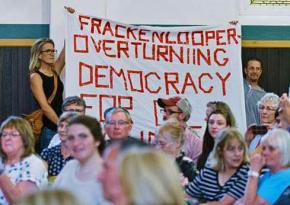Heckling Governor Frackenlooper
reports on the fight to defend Colorado's environment and residents from ongoing attacks by the oil and gas industry.
A SMALL but spirited group of protesters targeted Colorado Gov. John Hickenlooper during a June 8 appearance at church in Boulder where he was speaking to supporters and signing his new book The Opposite of Woe: My Life in Beer and Politics.
The book is a largely apolitical memoir about the governor's personal experiences and life story. The venue was chosen due to its proximity to the state's wealthier residential areas so Hickenlooper could focus on appealing to them and their money.
The governor's p.r. team clearly hadn't counted on even a peep of criticism, and the Colorado Community Rights Network (CoCRN) didn't let the opportunity slip away to hold Hickenlooper accountable for his shameful record on environmental safety and security.
Before the event began, a small crowd formed outside with signs and bullhorns. But the real action took place inside once the event itself got underway. A dozen protesters shared the pews with the other attendees, and when Hickenlooper began to speak, they began to disrupt the event. Using an Occupy-style mic check (amplifying a statement by having others repeat the words of the speaker), the protesters leveled an indictment of Hickenlooper's cozy relationship with the oil and gas industry.

The action continued for an hour after the event began. Initially, the governor did his best to ignore the protest for the first few minutes, and then he tried to drown out the protesters' words with a piano solo performed sloppily using the church's equipment. The resolute demonstrators refused to give up, however, and continued to disrupt the event until the crowd thinned out to a fraction of its former size, and the protesters were asked to leave or told they'd be arrested.
At least two of the demonstrators were harassed and abused as they spoke out, exposing the hypocrisy of the governor's admonitions about the protest stifling "free speech." Hickenlooper, who can always count on a media bullhorn to get his speech heard, declined to address the obvious disparity between the public spotlight he enjoys and the lack of any significant input by people shut out of the process by which Colorado's natural beauty is sliced and diced to serve the interests of the energy sector.
HICKENLOOPER HAS long been an ardent defender of the drilling and injection process known as hydraulic fracturing, or "fracking" for short. Despite overwhelming evidence that poor casings and cheap oversight has led to health and safety issues, the governor continues to advocate the benefits of fracking based on little more than a cursory inquiry into the subject--and a burning desire to ingratiate himself to the state's oil and gas sector.
Hickenlooper has a long history of antagonizing people angry about the environmental devastation he is wreaking.
In September 2013, flooding in Colorado inundated the infrastructure used to extract and transport oil and gas. Photographs of the destruction forced an admission by the Colorado Oil and Gas Conservation Commission (COGCC) that at least 10 distinguishable spills were intermingling with floodwater, totaling tens of thousands of gallons of crude oil and other hydrocarbons spilled into the soil. For his part, Hickenlooper was quick to dismiss the damage, insisting "there hasn't been that much leakage."
The disaster was likely responsible, at least in part, for a successful ballot measure in neighboring Lafayette, Colorado. Lafayette stands between Boulder and Weld County, and in November 2013, voters successfully passed a ballot measure banning fracking from their city. This was promptly overturned by a judge in Boulder as the governor himself sought to avoid enforcing the law by any means available to him.
Once the state of Colorado had ensured there was no legal route to environmental justice, the citizens of Lafayette, Denver, Boulder and Weld County began to organize. Forced to acknowledge the fact that the state was not democratically accountable and could not be politely convinced of the necessity for change, concerned citizens began to question what avenues were available to them--if successfully voting in a new policy didn't work, what would?
Out of this dialogue, CoCRN emerged. The disruption of the governor's book signing is one small act in a larger drama, and the experience has given CoCRN members a sense of both the opportunities and challenges ahead. The precise way forward may not be clear, but what is crystal clear is that the members of CoCRN are intent on continuing the fight to save their lives, families and livelihoods from the threat that environmental destruction poses.


